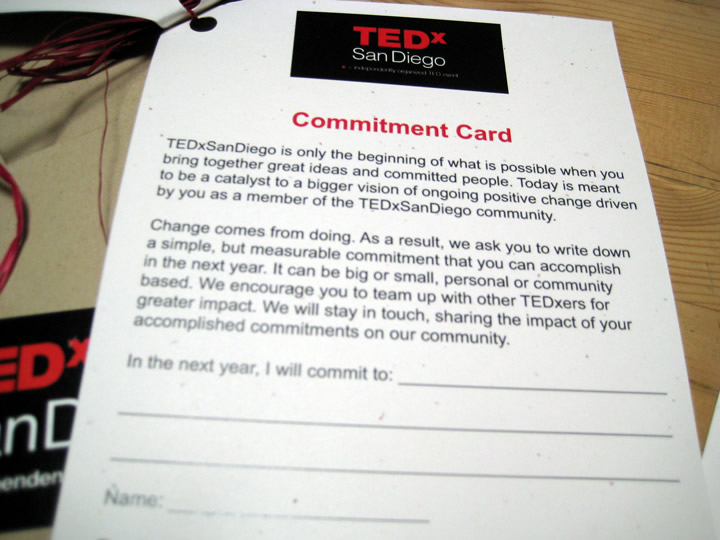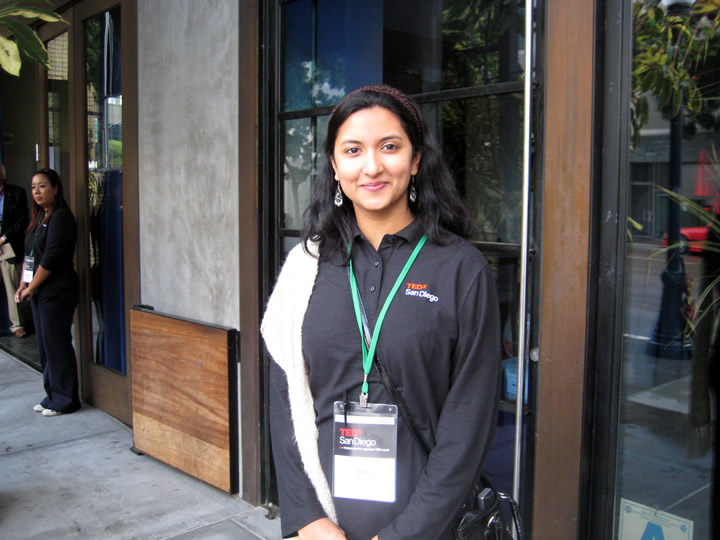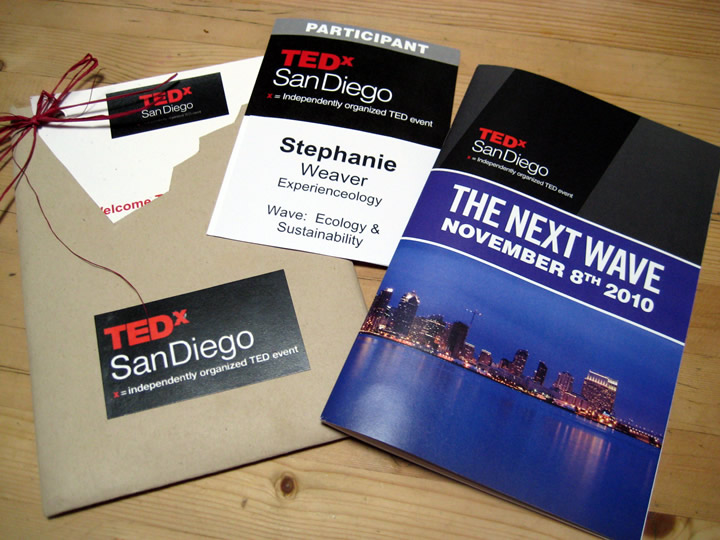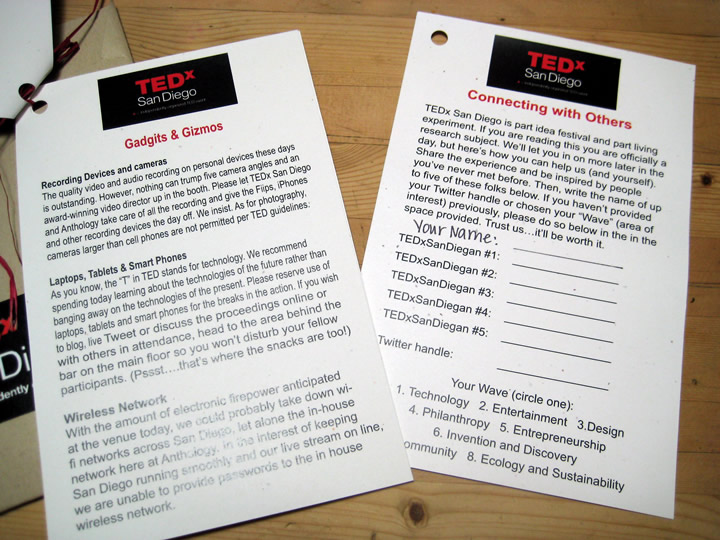by Stephanie Weaver
I was privileged to be one of about 300 people in the room at the first TEDxSanDiego. TEDx are independently organized events following the TED conference format. If you aren't familiar with TED talks, they are amazing, short, focused talks by the world's best speakers and thinkers, which are broadcast live (and recorded). (TED stands for Technology, Entertainment, Design, although the content is now much broader; their tagline is "Ideas worth spreading.")
Many people think that conferences are a dying format, and will soon go away entirely. At WMA in Portland I had several conversations with people about the future of conferences, including WMA. After attending TEDx, what I now think is that they've set a standard for the 21st-century conference. While more than 27,000 people watched the event live, and potentially millions more will see the talks once they are posted online, there was something amazing and energizing about attending live. So, here are seven things museum conference organizers can learn from TEDx.
1) People have to apply. They had a limited number of seats, but also they want this to be an event with intention. Having an application process creates not only a feeling of anticipation, but focuses the participants' intent on what will happen after the conference. You had to fill out an online application, which included explaining how you would spread the word about TEDx and what you learned afterwards. I heard that they received hundreds of applications. I know that I felt honored (and special) to be accepted. Before we left, we were asked to fill out commitment cards and turn them in. How might we apply this to WMA? Could there be some kind of application process that focused on how the attendee will use the information afterwards? Can we ask people to make commitments to use and spread the knowledge after the conference? Can we have sessions that continue and build from year to year, to address some of the critique that museum conferences tend to be for newbies, and don't offer rich content for people year after year?
 |
| What sort of follow-up might we ask of WMA attendees? |
2. The event started before the event. The pre-event emails were a masterful blend of welcoming language and logistical assistance. When I requested a special meal, I quickly received a warm, helpful response instructing me to let an usher know where I was sitting. Language included items like, "TEDxSanDiego concierge," "Event will start promptly with a spectacular opening," and "If you are not able to join us for the conference, please respond to this message so that we can offer your spot to another amazing person." I think WMA has done a pretty good job of this in the past, building excitement for upcoming sessions and host committees posting information about evening and special events.
3. The service was stellar. The all-volunteer event was staffed largely from folks at Sharp Healthcare in San Diego, a company which is known for redefining the patient experience. A phalanx of friendly hosts awaited us, outside and in, and circulated throughout the day offering assistance. This seems to vary from year to year, and I know it's difficult to get enough volunteers to work at our conference. Perhaps we could look outside our field for volunteers with this same kind of devotion? ConVis? Hospitals?
 |
| My first impression. |
 |
| Once through registration (lickety-split), delicious snacks & more volunteers awaited. |
4. The materials were beautifully designed, compact, and effective. This neat little package allowed us to have everything at our fingertips. The name badge included the day's agenda on the back, and had a pen inside.
My only critique had to do with a design choice that looked great in full light, but didn't work well in the dim light of the venue. The red text was unreadable whenever the lights were down. Is it time to do away with the bag or folder altogether, and make the packets small and compact like this? How else could we re-think the materials?
5. Speakers were dynamic, well-managed, and given presentation guidelines. We talk a lot about death by PowerPoint but very few conferences actually do something about it. TED has instituted the TED 10 commandments, which include giving a talk you haven't given before, not selling anything from the stage, and being humble. I think they must also give speakers guidelines on visuals, as nearly all the talks were visually stunning (or, radical notion: no slides at all—a fantastic speaker telling us a story.) They also give strict time limits... some people have 8 minutes, some 16. This helps break up the day, keep it moving, and encourages speakers to edit, edit, edit. Speakers were organized roughly by theme into sections, with 30-minute breaks in between. Slides provided a countdown (e.g. 5 minutes left in the break), while a well-chosen TED video provided the buffer to get people back to their seats. I appreciated all of the above, and have proposed to the program committee that we have one day TED-style in Honolulu. What do you WMA members think about that?
6. They included live performance. Why don't more conferences do this? While your conference might not be able to kick off and end with global phenomenon Jake Shimabukuro on ukulele (yes, you read that right), surely you can find some local talent who would be happy to play, dance, or paint in front of a live audience. Flamenco ukulele. Bluegrass ukulele. Schubert ukelele. Wrap your brain around that at a conference. I know we have done this to kick off some days in the past. I'd like to see artists more integrated into the fabric of the conference.
7. They gave you guidelines for interacting with other attendees: Meet at least six new people. Ask people what they love to do, not what they do. Put down your devices and be in the room. Change your seat at the end of each break. Approach people with this idea: "How can I serve you?" instead of, "What can you do for me?" They also gave us long enough breaks to actually interact.
A huge thank-you to the TEDxSanDiego organizers, sponsors, speakers, and attendees as well as the venue Anthology... It was a life-changing experience.
The Program Committee would love to hear your thoughts... does reading about TEDx get you excited for the possibilities for WMA? What would you like to see done differently?











Comments
I'll never forget being the only one who really believed our science center world congress in 2005 would be powerpoint-free. I also think you can find wonderful event volunteers - the key is whom you ask and how!
what a GREAT overview, Stephanie!! important post -- thanks for sharing!!
Stephanie this is really appealing especially for a repeat conference goer. Thanks for taking the time to share your thoughts!
Add new comment